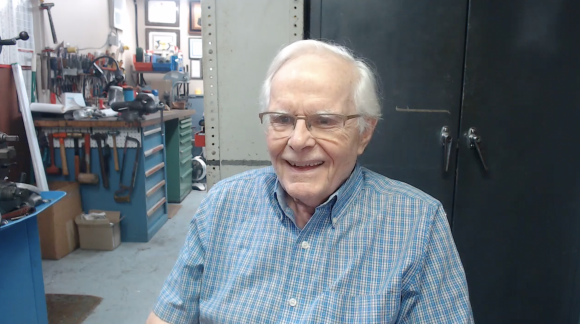Today’s guest on the show is Paul Huber, CEO of COMEX, in Monroe Connecticut. Paul is a machinery dealer specializing in cam Swiss automatics. That’s cam Swiss, not CNC. I’m talking about Bechlers, Stroms and Escomatics, not Citizens.
Paul is 84, but proudly says feels like he is 60 as he raises his 17-year-old son.
He has been working on screw machines for over 67 years, starting as an apprentice in Switzerland.
Early in his career, Paul worked as a technician for European screw machine builders. Later, he ran his own production shop in the US. Then he became a machinery dealer and sold some of the very first CNC Swiss machines. For decades, he has rebuilt and sold cam automatic screw machines, specializing in Swiss-type.
Paul learned business skills watching his dad wheel and deal as a dairy farmer in Basil, Switzerland. He managed a Jazz group as a teenager.
He is a skilled engineer, an astute entrepreneur, a natural at stumbling on serendipity and hell of a story teller. He also loves to speak his mind, which you will see when we discuss the skills gap problem in the United States.
So sit back and enjoy our conversation recounting Paul’s life’s journey. You’re going to learn some screw machining history, you’ll laugh, and I think you will get some inspiration for your own journey. I’ve given you some good highlights from the podcast below, but you really need to listen to get the full story!
Listen on your favorite podcast app using pod.link, or:
View the podcast our YouTube Channel.
Facebook: https://www.facebook.com/swarfcast
Instagram: https://www.instagram.com/swarfcast/
Twitter: https://twitter.com/tmwswarfblog
*************
Link to Graff-Pinkert’s Acquisitions and Sales promotion!
Interview Highlights
Paul’s Introduction to Screw Machines
Noah Graff: How did your career in machining start?
Paul Huber: We were seven kids. My dad insisted that each one of us learn a trade as an apprentice.
I was in the music business as a manager. I sometimes made more money than my dad, but he still insisted that I take an apprenticeship.
At age 17, I started my apprenticeship. Setup, maintenance and everything else related to Swiss screw machining. I was very lucky because the company which hired me as an apprentice needed somebody in the tool room, so my first six months were actually working in the tool room.
Graff: How did you feel about it? Did you like it?
Huber: Well, that’s the thing. I took that position only because I had my dad behind me ready to kick me in the behind. So I made the decision. Okay, there’s a job like just any other job I’m going to find. And within six months, I was hooked and it became a real challenge.
History of Swiss Machining
Huber: I failed French in school. So I said, maybe I should go to work in the French part of Switzerland. At least I’ll learn French. I went to Bechler.
Graff: Bechler was not bought yet by Tornos at that time? Which Swiss Brand was the first?
Huber: Tornos (was first). Bechler, Peterman, and Tornos, all started in Moutier, Switzerland. (Tornos bought Bechler in the ‘70s and bought Peterman before that.) Tornos never had the intention to continue the business of Peterman or Bechler. Tornos was really specialized for the watchmaking business. They really were looking to build smaller machines and higher precision. Bechler was more for all around. For example, the shaft in your blender. The drive shaft in your blender is made on Swiss.
The Skills Gap in the United States
Graff: So, what’s next for Paul?
Huber: Quite frankly, I wish I could say I want to get into education. But I gave up hope.
Mainly because we do not have the material to make skilled people. We have lost the ability to educate our young people in the United States. We are now in a situation where the majority of engineers are either foreign born and American educated or educated around the world–Japan, Europe, and they come here.
Can you imagine if the manufacturing industry would be like Gene Haas, spending millions of dollars every year for the education of their future users, on workers, on programmers?
Can you imagine if all manufacturing firms in the US did that where we would be today?
Graff: Thank you so much, Paul.
Huber: I’m very happy you gave me the opportunity to speak my mind. I get on some people’s nerves, but I talk fast!
Learn more about COMEX.
Podcast: Play in new window | Download





2 Comments
Noah,
I enjoyed listening to this interview. Good to hear from Paul and all the paths he’s taken in life. Guys like him are amazing especially when they can recall specific years that things happened and recall all the people and situations that they’ve come across like it was yesterday .
My early business days revolved around Swiss cam machines although I now run Swiss CNC. It was just so fascinating to watch all the tools on the machines move in and out with such perfect timing and to think that all the machine movements ran off of cams. I’ve got 2 cam machines stored in the back of my shop that I would like to one day setup and run again.
Here’s 2 videos of cam machines running that I had in my shop years ago. Not for promotion but for anyone interested in seeing one of these machines in action.
https://www.youtube.com/watch?v=TDxvBHXklJo
https://www.youtube.com/watch?v=zymiEXw6jZU
Best wishes to Paul as he continues his journey!
Very cool. Thanks for sharing the videos!